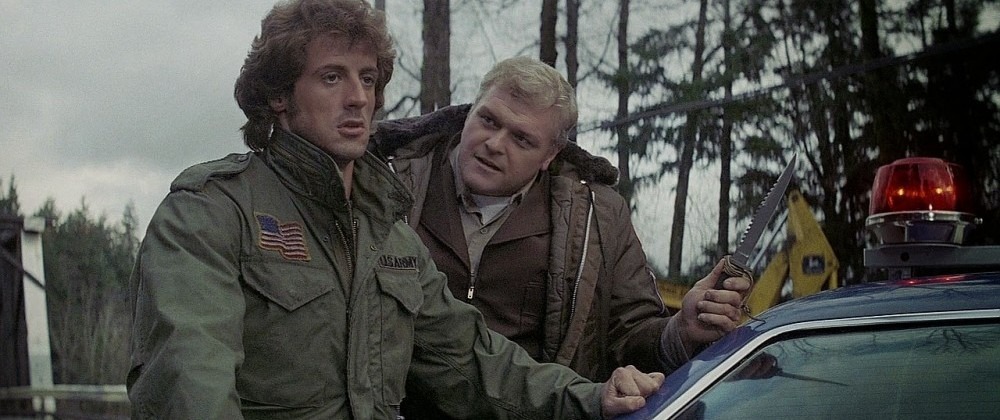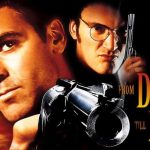“First Blood” (1982)

Ted Kotcheff’s “First Blood,” released in 1982, is a seminal action thriller that transcends its genre conventions to deliver a poignant and thought-provoking commentary on the effects of war, the treatment of veterans, and the struggle for survival in a hostile environment. Adapted from David Morrell’s novel, the film introduces audiences to John Rambo (played by Sylvester Stallone), a troubled Vietnam War veteran whose return to civilian life ignites a harrowing chain of events.

The narrative unfolds as Rambo, drifting through a small town in the Pacific Northwest, encounters hostility from the local law enforcement led by Sheriff Will Teasle (played by Brian Dennehy). Misunderstandings escalate into a violent confrontation, triggering Rambo’s instincts honed in the jungles of Vietnam. Fleeing into the wilderness, Rambo becomes the target of a manhunt led by Teasle and his deputies, who underestimate the skills and determination of their quarry.
Central to “First Blood” is its exploration of post-traumatic stress disorder (PTSD) and the psychological scars of combat. Rambo, haunted by memories of his traumatic wartime experiences, finds himself thrust into another battle for survival on home soil. The film’s portrayal of Rambo’s inner turmoil, conveyed through Sylvester Stallone’s nuanced performance, humanizes the character and invites empathy from viewers as he navigates a hostile environment both physically and mentally.

The conflict between Rambo and Sheriff Teasle serves as a microcosm of larger societal tensions. Teasle embodies the authority figures who fail to comprehend the plight of returning veterans, viewing Rambo through a lens of suspicion and fear. The film critiques the treatment of veterans and questions the societal responsibility to support those who have sacrificed for their country, highlighting the disconnect between military service and civilian life.
“First Blood” also examines themes of survival and resilience in the face of overwhelming odds. As Rambo evades capture in the dense forests of the Pacific Northwest, the film showcases his resourcefulness and adaptability, transforming him from a hunted fugitive into a formidable adversary. The wilderness itself becomes a character in the film, its unforgiving terrain reflecting the challenges Rambo must overcome to assert his survival instincts and reclaim his humanity.

Ted Kotcheff’s direction is marked by its atmospheric tension and stark realism. The film’s rugged cinematography, capturing the raw beauty and danger of the wilderness, immerses viewers in Rambo’s desperate struggle for freedom and redemption. Kotcheff’s emphasis on practical stunts and visceral action sequences enhances the film’s authenticity, reinforcing Rambo’s status as a reluctant hero driven by circumstance rather than choice.
In addition to its exploration of complex themes, “First Blood” is anchored by Sylvester Stallone’s commanding performance as John Rambo. Stallone’s portrayal balances physical intensity with emotional vulnerability, portraying Rambo as a multifaceted character grappling with trauma and resilience. Brian Dennehy delivers a compelling portrayal of Sheriff Teasle, embodying the antagonist’s stubborn resolve and eventual realization of the consequences of his actions.

The film’s impact extends beyond its narrative and performances to its broader cultural significance. “First Blood” spawned a successful franchise and solidified Sylvester Stallone’s status as an action icon. Its exploration of PTSD and societal attitudes towards veterans resonated with audiences, prompting discussions about the human cost of war and the challenges faced by returning soldiers.
In conclusion, “First Blood” stands as a landmark in action cinema, blending thrilling set pieces with profound thematic depth and social commentary. Ted Kotcheff’s sensitive direction, coupled with Sylvester Stallone’s indelible performance, has ensured that the film remains a timeless exploration of trauma, survival, and the enduring resilience of the human spirit. Through its portrayal of John Rambo’s journey from soldier to survivor, “First Blood” continues to captivate and provoke thought, reaffirming its status as a classic of its genre and a testament to the enduring power of storytelling.










